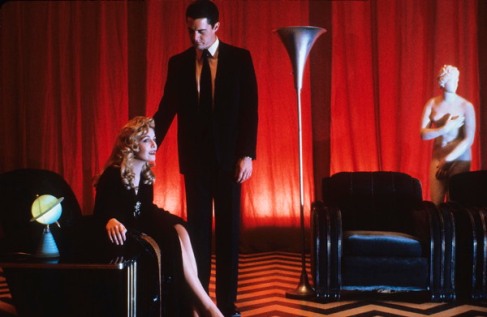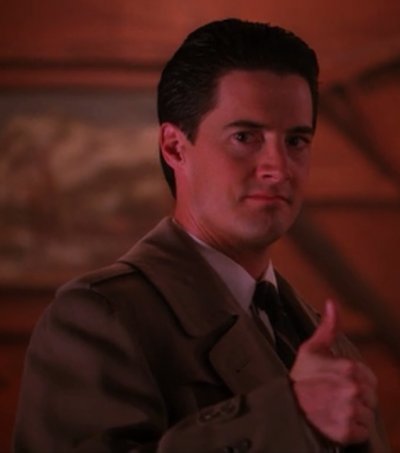Now that Episodes 14 – 16 have been covered, part 3 of this series about the central mystery in Twin Peaks will go back, as Lynch did, to the beginning and what set the events of the series in motion.
Twin Peaks: Fire Walk with Me (1992): A Midnight Show
I hadn’t finished the second season before going seeing Twin Peaks: Fire Walk with Me last month, but that’s OK, because the movie was a prequel focusing on the days leading up to Laura Palmer’s murder. It also included the investigation into the death of Teresa Banks, which took place a year before and had the same MO. If you haven’t seen up to Episode 14/”Lonely Souls” of the show and have not been spoiled about the major reveal, though, it would be best to get there before seeing this.
Fire Walk with Me begins contains two narratives. It begins with the investigation into the murder of Theresa Banks in an extended prologue, and then goes into the final days of Laura Palmer. In an extended prologue, FBI Regional Chief Gordon Cole, played by David Lynch himself, assigns Special Agents Chester Desmond (Chris Isaak) and Sam Stanley (Kiefer Sutherland) to the case. Desmond is similar to Cooper in his perceptiveness and somewhat quirky, unorthodox investigative, though he’s more forceful. He acts as a mentor to Stanley during the course of the investigation and has a likable demeanor. His ways of getting the locals, including a hostile sheriff’s department, to cooperate with the FBI’s investigations provide a good amount of humor in an otherwise dark film.
Audience expectations that Desmond would be a hero who might help uncover clues to the mythology of Twin Peaks are subverted when he mysteriously disappears. The last time he is seen, he is picking up a ring, and while the ring reappears later, he does not. Cooper, investigating Desmond’s disappearance, only finds the words “Let’s rock” scrawled on the missing agent’s car. The same words were spoken by the Man from Another Place (the dwarf in the red suit who first appeared to Cooper in his dreams in Twin Peaks), implying involvement of the Black Lodge, though he would not know this at the time.
After the prologue, we are re-introduced to the town of Twin Peaks, and here, Lynch shows his skills at tapping into both warm familiarity and unease. There’s something very reassuring to hear the opening theme song of the show as we see Donna and Laura leave for school and walk past picture-perfect lawns and suburban homes, sometimes running other townspeople. It feels almost like a second opening credits sequence for the movie and ends a darker note with Laura snorting a line of cocaine in the bathroom, setting the audience up for the darker second story.
Lynch takes the story to some dark places as the narrative progresses toward its nightmarish, tragic conclusion. Though the show might have its lighter subplots, quirky characters, and moments of sentimentality to balance out the show’s exploration of lost innocence and the dark underbelly of suburbia, the film is generally pretty grim. The moment Laura discovers the identity of Bob’s host is not a twist to those already familiar with the show, but it is a shocking, disturbing scene, because it occurs during a rape and due to the relationship between the perpetrator and victim. Her death scene where she is tied and murdered in an abandoned train car is brutal, visceral, and difficult to watch, particularly because the view is obscured by darkness and all we hear are her heartrending screams.
There is plenty of trademark Lynchian weirdness, both humorous and unnerving, and in both the surreal and the grounded drama, there is a strong sense of unease, decay, and of loss of control. In the prologue, Lynch struts out surreal humor with the character of Lil the Dancer. In the role of Gordon Cole, he introduces her to agents Desmond and Stanley to perform something of an interpretive dance, providing clues to the agents before they leave on their assignment. There’s a pretty great cameo by David Bowie as Phillip Jeffries, another FBI agent who went missing. He suddenly reappears at the FBI regional headquarters, seemingly unhinged and speaking in a raving, incomprehensible manner while we see images of the supernatural characters from Twin Peaks, before disappearing again. Both this and the disappearance of Agent Desmond highlight the lack of control of law enforcement at protecting the innocent and their own. (Hint: If you don’t want to mysteriously disappear, don’t join the FBI in David Lynch’s Twin Peaks universe.)
In Laura’s narrative, we see the disintegration of her family as the story progresses. Laura and her friends find themselves in outrageous, increasingly dangerous situations. A night out with Donna turns into an alcohol- and drug-fuelled nightmare that almost ends in a date-rape, and a drug deal with Bobby ends in a real murder. Strange figures visit Laura in broad daylight and in her dreams; paintings in her room seem to come alive at times; and she is haunted and abused by the supernatural entity and her would-be murderer Bob.
The characters from the Black Lodge, including the Man from Another Place, the One-Armed Man Mike, Bob, an older woman and her masked grandson (previously seen by Donna) all make appearances. Their presence is generally marked with a sense of unease, as they deliver cryptic, portentous statements, or speak incomprehensibly. Lynch’s strong point is to insert the strange into the seemingly mundane. Through the use of distorted, cacophonous sounds, sudden change in colors and visuals, close-ups, and sudden appearance of bizarre, deranged characters, he makes the stranger moments in the film all the more unsettling.
I admit I wasn’t too crazy about the idea a full-length film about Laura Palmer’s last days. The details of her life and the identity and motivation of the murderer had been explored in the show after all. Lynch nonetheless manages to create a very unnerving, dark film. The dual-narrative that follows two protagonists who fall victim to paranormal forces feels hopeless, and Fire Walk with Me enriches, but not necessarily clarifies, the mythology of the world Lynch created in Twin Peaks, as we get a greater sense of the forces at play, though their motives remain inscrutable.
It’s not hard to see why Fire Walk with Me was not a huge commercial and critical success. As a standalone narrative on its own, it doesn’t really work too well, and the film’s lurid subject matter, including teenage promiscuity, drugs, rape, prostitution, and murder, and grim tone can be off-putting. With its references to the show, it’s very much a movie made for fans of Twin Peaks. Even then, it doesn’t always offer the answers or closure that they seek, and it’s not at all readily comprehensible to those unfamiliar with Twin Peaks. That said, the hazy, mysterious, dream-like (even nightmarish) atmosphere does make Fire Walk with Me a great experience late at night. It helped that the interior of the State Theater in Ann Arbor where I saw the movie looks a bit like the Black Lodge with all of the red drapes. As I was leaving, I overheard a guy say, “I’m not going to sleep for a week.” I can’t think of a better compliment for something like Fire Walk with Me.

